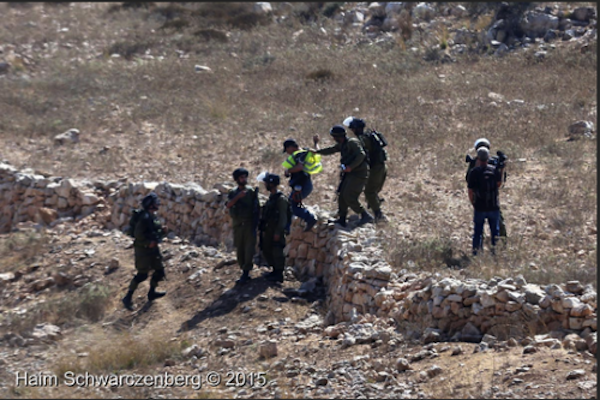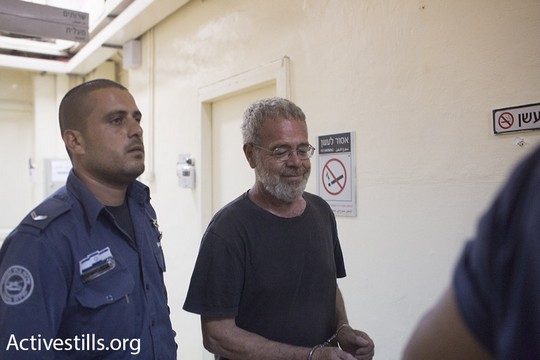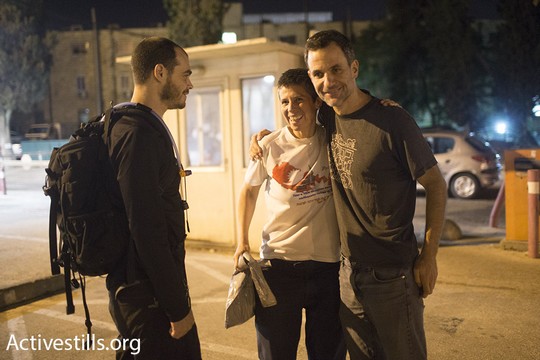Israeli soldiers arrested two Israeli and one Palestinian photographers during a demonstration in the West Bank. What followed showed just how differently Israelis and Palestinian detainees are treated.
By Oren Ziv / Activestills.org

Israeli soldiers arrested three photographers, two Israelis and one Palestinian, during the weekly protest in the West Bank village of Nabi Saleh last Friday. On Saturday night, an Israeli court ruled that there was no reason for the arrests and released the two Israelis from detention.
On Sunday morning, Israel Police agreed to release the third photographer, Bilal Tamimi, without conditions, following a request by his attorney. Tamimi is expected to be released soon.
Weekly anti-occupation demonstrations have been taking place in the village of Nabi Saleh, near Ramallah, for the past several years. Every week, dozens of Palestinians, Israelis and international activists march toward a spring that has been taken over by residents from the nearby settlement, Halamish. The soldiers arrested Tamimi, himself a resident of the village, toward the end of the demonstration, as village youths clashed with soldiers on a nearby hill.
A short while later, the soldiers arrested B’Tselem Spokesperson Sarit Michaeli as well as Israeli artist David Reeb, both of whom have been documenting the protests with their cameras for years. The two were arrested for refusing to clear the area, which they deemed a “closed military zone.” The soldiers, however, refused to present the required, written order.
The three were taken to the Binyamin Police Station, where they discovered that along with violating the closed military zone order, Reeb and Tamimi were accused of attacking an officer, while Michaeli was accused of obstructing a police officer in the line of duty. After their interrogation, Michaeli and Reeb refused to sign off on the conditions of their release, which would ban them from the village for two weeks, while setting their bail at NIS 1,000. Upon refusing, the two were taken into detention. Tamimi was not offered these conditions and was taken straight to jail at Ofer military prison.
“It was clear that the arrest was unlawful,” Michaeli said following her release. “The fact is that they agreed to release us, even on condition, while it was clear that they would never allow Bilal the same conditions. That is why we refused to agree to those terms, even if it meant a night in jail.”

Michaeli and Reeb were brought before a judge at the Jerusalem Magistrates Court on Saturday night. During the hearing, Attorney Neri Ramati, who represented the detainees on behalf of Attorney Gabi Lasky’s office, asked the police representative whether the soldiers presented Michaeli and Reeb with a written copy of the closed military zone order. When the representative admitted that they had not done so, Judge Gad Arenberg ordered the two be released without condition.
“In this case the judge decided to release the detainees not only because they were not shown the closed military zone order, but also because they demanded to see the order and were arrested. Furthermore, the judge noted that the detainees were filming and were not connected to the clashes taking place,” said Ramati following the decision.
It is important to note that because it is unclear whether violating a closed military zone order is in fact illegal, and because it is doubtful whether such a violation merits arrest and release on condition, soldiers and policemen often tack on additional violations such as obstructing or attacking an officer. “Violation of a closed military zone order has no parallel offense in Israeli law, and we have never had a case in which someone has been accused solely of violating such an order. In these cases the police always add additional offense.”
Michaeli points to the different treatment that she and Reeb, both Israeli citizens, received, as opposed to Tamimi. “David, Bilal, and I were arrested at the same spot and interrogated over the same offenses, but we were treated differently, since Bilal is Palestinian and is subject to Israel’s military law. We are Israelis, and thus enjoy the benefits of Israel’s civilian legal system.”

Following the court’s unequivocal decision Saturday night, Israel Police accepted Attorney Ramati’s request to release Tamimi without conditions.
Tamimi’s release is not an everyday occurrence. Most Palestinians arrested in the occupied territories remain in detention until the end of legal proceedings. Moreover, the military legal system almost never offers alternatives to detention, such as house arrest, while the conviction rate for Palestinians in Israel’s military courts stands at 99.74 percent.
Several months ago, soldiers violently attacked Israeli photojournalist Haim Schwarczenberg and a Abbas Mumani, who works for AFP, as they attempted to comply with orders to leave the area. The army decided to try the attacking soldiers after the incident was filmed and first published on +972 Magazine,
This article was first published in Hebrew on Local Call. Read it here.


